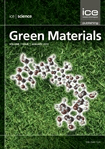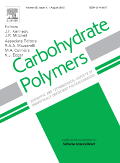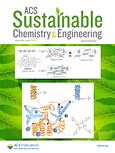
Green Materials
Scope & Guideline
Transforming challenges into sustainable material solutions.
Introduction
Aims and Scopes
- Sustainable Material Development:
The journal emphasizes the development of materials that are environmentally friendly, utilizing renewable resources to reduce reliance on fossil fuels and non-renewable materials. - Innovative Processing Techniques:
Research on novel processing methods that enhance the performance and sustainability of materials, including techniques such as 3D printing, laser sintering, and green synthesis. - Biocomposites and Biopolymers:
A significant focus on the utilization of natural fibers and biopolymers, exploring their mechanical properties and potential applications in various industries, including packaging and construction. - Waste Utilization and Recycling:
Studies on transforming waste materials into valuable resources, promoting circular economy principles by recycling and repurposing industrial and agricultural by-products. - Nanomaterials and Their Applications:
Exploration of nanotechnology in materials science, including the synthesis and application of nanomaterials for enhanced performance in various fields such as electronics, medicine, and environmental remediation.
Trending and Emerging
- Green Synthesis Techniques:
There is a growing trend in utilizing green chemistry principles for the synthesis of materials, including the development of eco-friendly synthesis methods that minimize harmful by-products. - Functionalized Biocomposites:
Research on biocomposites that incorporate functional additives or treatments to enhance properties such as flame retardancy, antibacterial activity, and mechanical strength is increasingly prominent. - Smart and Adaptive Materials:
The emergence of smart materials that respond to environmental stimuli is gaining traction, with studies focusing on their applications in various sectors, including construction and electronics. - Circular Economy Practices:
An increasing number of publications emphasize the importance of circular economy practices, exploring innovative methods for waste reduction, recycling, and sustainable resource management. - Nanotechnology in Material Science:
The application of nanotechnology in developing advanced materials is trending, with a focus on enhancing material performance, functionality, and environmental sustainability.
Declining or Waning
- Traditional Synthetic Polymers:
There is a noticeable decrease in research related to conventional synthetic polymers, as the journal shifts its focus toward more sustainable alternatives and biodegradable options. - Conventional Energy Materials:
Research on materials primarily associated with fossil fuel energy sources is declining, as the journal increasingly prioritizes renewable energy solutions and sustainable material innovations. - Non-Biodegradable Composites:
The emphasis on non-biodegradable composites is waning, with fewer studies exploring their properties and applications, in favor of biodegradable and eco-friendly composite materials.
Similar Journals

Carbohydrate Polymers
Pioneering breakthroughs in carbohydrate applications.Carbohydrate Polymers is a prestigious academic journal, published by ELSEVIER SCI LTD, that plays a vital role in the field of materials chemistry, organic chemistry, and polymer science. With its Q1 category rankings in these domains, this journal serves as a critical platform for disseminating high-quality research, innovative methodologies, and significant advancements in carbohydrate-based polymers. Since its inception in 1981 and continuing until 2025, it has fostered critical discussions and collaborations among researchers, professionals, and students worldwide. Although it does not offer open access, its rigorous peer-review process ensures that only the most impactful studies are published. By highlighting new developments in the synthesis, characterization, and application of carbohydrate polymers, Carbohydrate Polymers consistently contributes to the enhancement of knowledge and technology within its field, making it an essential resource for anyone working at the intersection of chemistry and materials science.

JOURNAL OF CELLULAR PLASTICS
Unveiling the Potential of Cellular PlasticsThe JOURNAL OF CELLULAR PLASTICS, published by SAGE PUBLICATIONS LTD, stands as a significant resource in the fields of Chemistry, Materials Chemistry, and Polymers and Plastics. With an ISSN of 0021-955X and an E-ISSN of 1530-7999, this esteemed journal has been contributing to scientific knowledge since its inception in 1965 and is slated to continue its impactful publication through 2024. Ranking in the Q2 category across its respective fields in 2023, and consistently positioned within the 61st to 63rd percentile in Scopus rankings, it is recognized for disseminating high-quality research that advances our understanding of cellular plastics. Although it operates under a subscription model, the journal remains dedicated to fostering scholarly discourse and innovation, making it an essential platform for researchers, industry professionals, and students eager to explore the latest advancements in polymer science.

GIANT
Fostering Global Collaboration in Cutting-edge Research.GIANT is a pioneering open-access journal published by Elsevier that has rapidly established itself as a cornerstone in the fields of Chemistry, Materials Chemistry, Polymers and Plastics, and Surfaces, Coatings and Films. Since its inception in 2020, GIANT has been committed to disseminating cutting-edge research and facilitating scholarly communication in these dynamic areas. With a remarkable Q1 ranking across multiple categories, the journal reflects an impressive impact factor within the academic community, evidenced by its standing in the top 82nd percentile in several Scopus classifications. Based in the Netherlands at Radarweg 29, Amsterdam, GIANT embraces a global audience through its open-access model, ensuring that groundbreaking discoveries are accessible to researchers, professionals, and students alike. Fostering innovation, the journal strives to shape the future of materials science and chemistry, making significant contributions in an era characterized by rapid scientific advancement.

POLYMER BULLETIN
Fostering Collaboration in Interdisciplinary Polymer StudiesPOLYMER BULLETIN is a prominent journal in the field of polymer science, published by SPRINGER in Germany. Established in 1978, this peer-reviewed journal focuses on the latest research and developments in polymer chemistry, materials science, and condensed matter physics, boasting a commendable impact factor indicative of its rigorous academic standards. With a Q2 ranking in multiple categories including Chemistry (Miscellaneous), Condensed Matter Physics, Materials Chemistry, and Polymers and Plastics, POLYMER BULLETIN serves as an essential resource for researchers, professionals, and students aiming to stay abreast of innovative findings and methodologies within these interdisciplinary landscapes. Although the journal does not currently offer open access, it provides invaluable insights and data that significantly contribute to the advancement of polymer science. For more information and to access published articles, visit the journal's page on the Springer website.

Materials Today Sustainability
Championing high-impact research for a sustainable planet.Materials Today Sustainability is a leading journal in the interdisciplinary field of sustainable materials, published by ELSEVIER. With a strong commitment to advancing knowledge in sustainability and materials science, this journal encompasses a broad range of topics, including renewable energy innovations, sustainable engineering, and eco-friendly materials development. Achieving a prestigious Q1 ranking in 2023 across Chemistry (Miscellaneous), Materials Science (Miscellaneous), and Renewable Energy, this journal plays a crucial role in disseminating high-impact research that addresses global sustainability challenges. With an impressive Scopus ranking that positions it among the top journals in Chemistry, Materials Science, and Renewable Energy, Materials Today Sustainability is an invaluable resource for researchers, professionals, and students dedicated to driving forward the agenda of sustainability and material innovation. The journal is accessible through a robust open access model, ensuring the research reaches a global audience, facilitating collaboration and innovation in this critical field.

CELLULAR POLYMERS
Transforming Ideas into Polymer InnovationsCELLULAR POLYMERS, published by SAGE Publications Ltd, is a leading journal dedicated to the exploration and advancement of polymer science, particularly within the realms of organic chemistry and materials science. With an ISSN of 0262-4893 and E-ISSN of 1478-2421, this journal has been a critical resource for researchers and professionals since its inception in 1982, continuously evolving to retain its relevance in an ever-advancing field. Currently, it ranks in the Q3 quartile for both Organic Chemistry and Polymers and Plastics, reflecting its focused contributions to these disciplines. Despite accessing content through subscription, the journal’s indexed visibility in databases such as Scopus, with a percentile ranking of 41st in its category, highlights its significance in the academic community. CELLULAR POLYMERS serves as a platform for innovative research and developments in polymer processing, characterization, and applications, aiming to foster interdisciplinary collaborations and knowledge dissemination among scholars, practitioners, and students alike.

JOURNAL OF POLYMERS AND THE ENVIRONMENT
Empowering Academics with Insights on Polymers and SustainabilityJOURNAL OF POLYMERS AND THE ENVIRONMENT, published by Springer, is a leading academic journal in the fields of environmental engineering and materials chemistry, providing a vital platform for researchers, professionals, and students engaged in the study of polymers and their environmental impacts. With an impressive impact factor, the journal has established itself as a crucial resource in both the Q1 and Q2 quartiles for its respective categories, demonstrating its high-quality contributions to the scientific community. The journal, with ISSN 1566-2543 and E-ISSN 1572-8919, has been active since 2000 and continues to evolve as it converges towards 2024, ensuring it stays at the forefront of innovative research. Researchers will find the journal’s comprehensive analysis of polymers and sustainability foster a thorough understanding of contemporary issues while contributing to the sustainable development of materials. With an ever-expanding repository of open access content, the journal ensures wide dissemination of valuable knowledge, making it an essential aspect of the academic landscape in the United States and beyond.

Chemical Methodologies
Bridging Theory and Practice in ChemistryWelcome to Chemical Methodologies, a premier journal published by SAMI PUBLISHING CO-SPC, dedicated to advancing the field of chemistry through innovative research and methodologies. With an ISSN of 2645-7776 and an E-ISSN of 2588-4344, this journal provides a vital platform for researchers and scholars to share their findings in areas encompassing physical, theoretical, and organic chemistry. Despite its initial HIndex and quartile rankings still being established, the journal's evolving impact within the academic landscape is underscored by its Scopus Ranks, which place it in the 35th percentile for physical and theoretical chemistry and the 33rd percentile for organic chemistry. Since its inception in 2022, and continuing through 2024, Chemical Methodologies aims to foster collaboration and knowledge dissemination among academics and practitioners alike, bridging theoretical concepts and practical applications. This open-access platform enhances accessibility for researchers and students worldwide, ensuring that groundbreaking contributions to chemical science reach a broad audience.

ACS Polymers Au
Catalyzing innovation in materials science and engineering.ACS Polymers Au, published by the American Chemical Society, is an innovative open-access journal dedicated to advancing the field of polymer science. Launched in 2021, this journal offers researchers, professionals, and students a platform to publish and access high-quality research articles without the barrier of paywalls, thereby fostering greater collaboration and knowledge sharing within the scientific community. With a focus on polymers and plastics, as well as their applications in materials science and chemical engineering, ACS Polymers Au is recognized for its rigorous peer-review process and commitment to maintaining high research standards. Although currently ranked in the lower percentiles across various categories in Scopus metrics, its dynamic publication format allows for rapid dissemination of cutting-edge findings. As the journal continues to grow and evolve alongside the polymer community, it remains an invaluable resource for those aspiring to enhance their scientific understanding and contribute to the future of polymer research.

ACS Sustainable Chemistry & Engineering
Empowering researchers to shape a sustainable future.ACS Sustainable Chemistry & Engineering is a premier journal published by the American Chemical Society, dedicated to advancing knowledge and innovation in the fields of sustainable chemistry and engineering. With an impressive impact factor and a consistent ranking in the Q1 category across various disciplines such as Chemical Engineering, Chemistry, Environmental Chemistry, and Renewable Energy, this journal serves as a vital resource for researchers, professionals, and students alike. Since its inception in 2013, the journal has been committed to publishing high-quality, peer-reviewed articles that address the critical challenges of sustainability in chemistry and engineering. With no open-access option currently available, the journal emphasizes the importance of premium scholarly communication. As the field continues to evolve, ACS Sustainable Chemistry & Engineering remains at the forefront of providing cutting-edge research that impacts our understanding and application of sustainable practices in the chemical sciences.